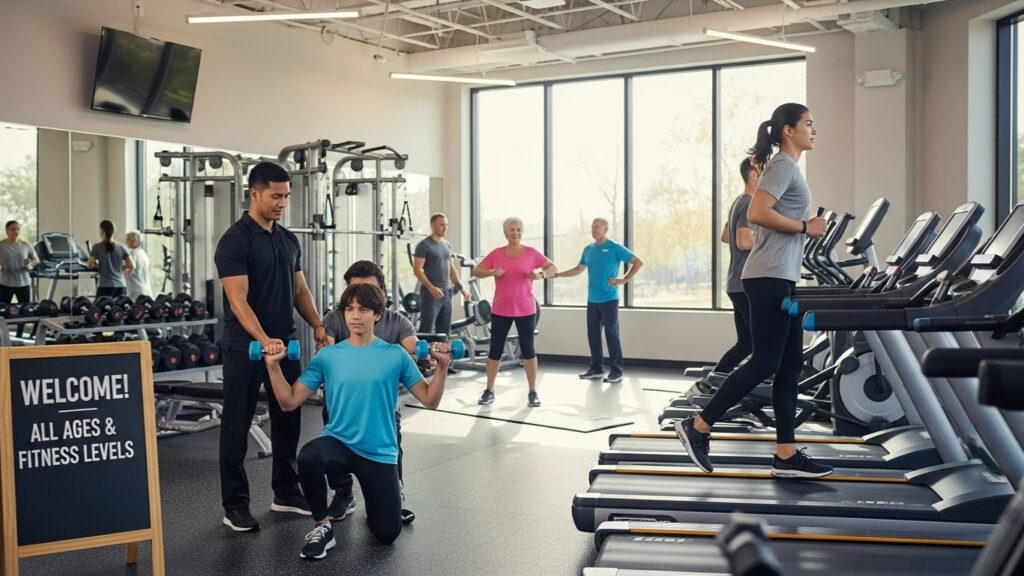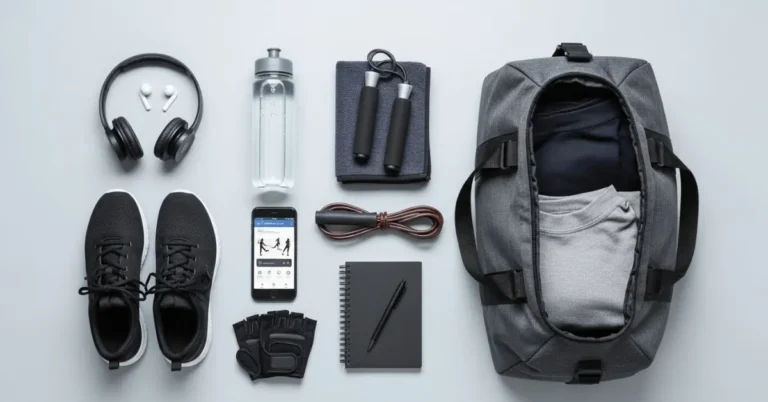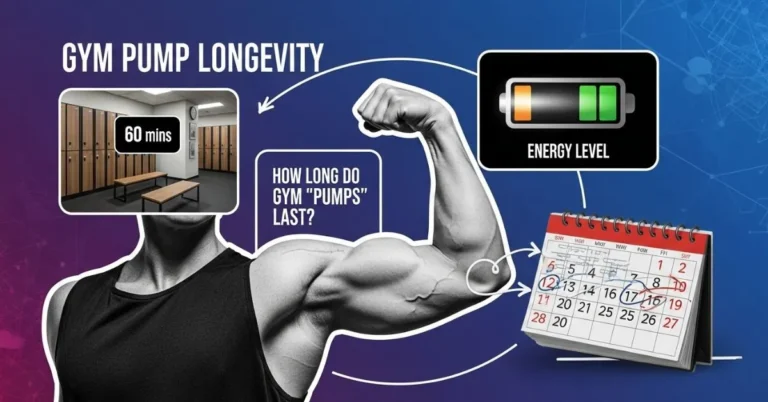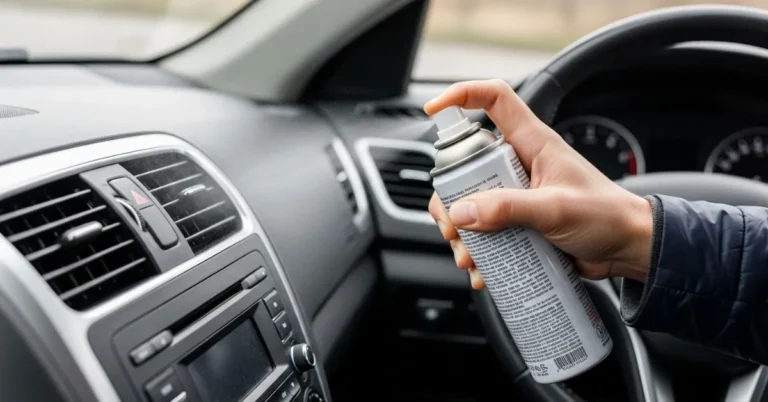Let me set the scene: I was sipping my post-workout protein shake, scrolling through playlists, when I got a text from my 13-year-old nephew:
“Hey Uncle J, what age can you be to go to the Gym? Asking for science.”

He and his friend tried to walk into a gym like two mini Hulks only to be stopped at the door. No ID, no waiver, no guardian. Just enthusiasm and maybe a sugar rush from energy drinks.
That moment sparked a deep dive. At what age can you go to the gym? The rules vary more than you might expect. So if you’re a teen, a parent, or just someone trying to get your family fit, keep reading I’ve got answers, age-specific tips, and some surprising gym rules decoded.
Contents
- 1 What Age Can You Be to Go to the Gym?
- 2 Major Gym Chains and Their Age Rules
- 3 Gym Access by Age Group – A Breakdown
- 4 Why Do Gyms Have Age Restrictions?
- 5 Informational Tools Teens Can Use to Start Training Smart
- 6 Legal Factors: Parental Consent & Gym Liability
- 7 Should Teens Even Be Going to the Gym?
- 8 Affordable Gym Alternatives for Under-16s
- 9 Youth Fitness Trends in 2025
- 10 What Parents Should Know Before Signing a Gym Contract
- 11 FAQs: What Age Can You Be to Go to the Gym?
- 12 Expert Thoughts: From Curious Teens to Lifelong Lifters
- 13 About the Author
What Age Can You Be to Go to the Gym?
The short answer is that it depends on the Gym, the state, and whether a parent or guardian accompanies you.
- Some gyms allow kids as young as 13 with a parent or a signed waiver.
- Most require members to be 16+ for solo workouts.
- A few (like Planet Fitness) allow 13-year-olds with supervision.
But don’t expect a uniform rule. Each gym chain and franchise sets its minimum age and policy for minors.
Major Gym Chains and Their Age Rules
1. Planet Fitness
- Minimum age: 13 years old
- Ages 13–15: Must be with a parent or guardian
- Ages 16+: Allowed solo with signed waiver
2. LA Fitness
- Minimum age: 14 years old
- Under 18: Needs parent/guardian signature
- Some locations offer youth memberships
3. Anytime Fitness
- Varies by franchise (standard minimum: 13–16)
- Minors need adult consent
- 24-hour access? Not always for under-18s
4. YMCA
- One of the most youth-friendly gyms
- Ages 10–13 can use the equipment with supervision
- Teen-specific programs available
5. Gold’s Gym
- Generally 16+ for solo access
- Some allow 13+ with a parent or training program
Tip: Always call your local branch, even for big chains. Many operate independently.
Read More: How Old Do You Have to Go to a Gym? Age Rules Explained
Gym Access by Age Group – A Breakdown
Ages 0–12: Play Zone Only
At this age, gyms are more about childcare services than workouts. Think playpens, supervised activity rooms, or kid zones while the parent trains.
Ages 13–15: With Supervision
This is the age when most gyms open their doors, but only with:
- A parent or legal guardian
- Signed waiver or membership form
- Restricted access to specific equipment
These young teens can usually do:
- Cardio (treadmill, stationary bike)
- Bodyweight training
- Light resistance machines (under supervision)
Ages 16–17: Almost Free Range
Many gyms start treating 16+ teens like adults:
- Independent access allowed
- Must have a signed parental consent
- Free weights and machines are accessible
This is a great age to introduce strength training safely under guidance.
18+: Adult Membership Freedom
You’ve hit the gym jackpot. No waivers, no supervision just good ol’ sweat and gains.
Why Do Gyms Have Age Restrictions?
It’s not about gatekeeping but safety, legal responsibility, and equipment risk.
- Injury Risk: Young bodies are still developing. Poor form = long-term damage.
- Insurance Policies: Liability for minors is a big deal for gyms.
- Equipment Hazards: Free weights and machines can be dangerous without proper training.
Gyms want to protect both young members and their bottom lines.
Informational Tools Teens Can Use to Start Training Smart
If your teen can’t hit the Gym yet, don’t worry. There are still ways to stay active and build a fitness routine.
Here are informational products to consider (and yes, these are soft promo ideas too):
1. Bodyweight Training Guides for Teens
Perfect for home workouts with zero equipment.
2. Fitness Apps with Age Filters
Apps like FitOn, Nike Training Club, or Sworkit Youth let younger users train safely.
3. Printable Workout Logs or Journals
Great for tracking goals and habits without diving into heavy lifting.
4. Beginner Yoga or Stretching Programs
Flexibility builds foundation strength for later gym workouts.
These tools are budget-friendly and educational, and they build long-term habits.
Legal Factors: Parental Consent & Gym Liability
In the USA, any gym membership under 18 typically requires:
- A parent or legal guardian’s signature
- Liability waiver acknowledgement
- Sometimes, in-person orientation
State laws might influence:
- Age of legal consent
- Supervision rules
- Insurance minimums
Pro Tip: Print and sign waivers before heading in with your teen to save time.
Should Teens Even Be Going to the Gym?
Short answer: Yes, but responsibly.
- Boosts confidence and discipline
- Improves mood and focus
- Supports growing bones and muscles
- Teaches long-term fitness habits
But supervision, age-appropriate training, and rest days are crucial.
Affordable Gym Alternatives for Under-16s
Not every young teen needs a gym pass to stay fit. Try:
- Community centres or YMCA programs
- P.E.-based home workouts
- YouTube channels for teen fitness
- School sports clubs
Bonus: These options are often free or under $10/month.
Youth Fitness Trends in 2025
Fitness isn’t just for adults anymore. Here are some hot trends among youth:
- Virtual training with avatars
- Gamified fitness apps
- Mindfulness + movement combo (like yoga + journaling)
- TikTok-inspired home challenges
- Teen gym zones are popping up in suburban gyms
The goal? Fun, flexibility, and body confidence not max reps or Insta abs.
What Parents Should Know Before Signing a Gym Contract
Check:
- Age minimum and waiver requirements
- Supervision policies
- Gym hours for minors
- Staff qualifications and CPR training
Watch out for:
- Long-term contracts
- Fees for minors or guest passes
- Hidden rules in fine print
A quick call to your local Gym can save you (and your kid) a ton of hassle.
Read More: How to Get in the Fortree Gym: Step-by-Step Guide
FAQs: What Age Can You Be to Go to the Gym?
1. What age can you be to go to the Gym without a parent?
Answer: Most gyms require you to be at least 16 years old for solo access, though this varies. Always check your Gym’s policy.
2. Can a 13-year-old work out at the Gym?
Answer: Yes, but usually with a parent or guardian and possibly limited to specific equipment or classes.
3. Are there gyms made just for teens?
Answer: Some community centres and YMCA locations offer teen-specific programs, classes, or workout zones.
4. Do I need a doctor’s note to start going to the Gym at a young age?
Answer: Not typically, but it’s wise to consult a paediatrician before starting any fitness routine for kids with health conditions.
5. Can kids under 10 join gyms?
Answer: Not for workouts most gyms only allow them in childcare areas, not on equipment.
Expert Thoughts: From Curious Teens to Lifelong Lifters
What age can you be to go to the gym? It depends, but being informed is half the battle. Whether you’re a parent navigating gym policies or a teen eager to start your fitness journey, the right approach makes all the difference.
Start with:
- Age-appropriate routines
- Supervision when necessary
- Informational tools for innovative training
- A gym that supports youth development
Let’s recap:
- Under 13? Stick to play zones or home workouts.
- 13–15? Supervised sessions and waivers.
- 16+? You’re almost there read the rules, stay safe.
- 18+? Game on.
Fitness is for every age. The key is knowing when and how to start safely.







